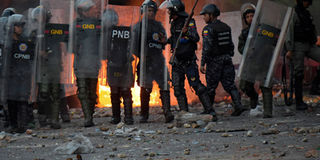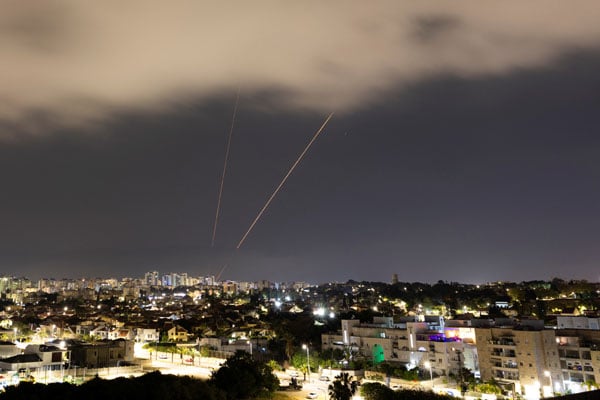What are Guaido's options for blocked Venezuela aid?

Venezuelan security forces clash with supporters of Venezuelan opposition leader Juan Guaido on the Venezuelan head of the Francisco de Paula Santander International Bridge, as seen from Cucuta, Colombia, on February 25, 2019. AFP PHOTO
What you need to know:
Guaido travelled to Colombia on Friday, going against a ban on leaving the country. He says he crossed with aid from the military.
Venezuelan opposition chief Juan Guaido promised to bring international humanitarian aid into his country last weekend by all means necessary, but his plan failed in the face of resistance by forces loyal to President Nicolas Maduro.
Following the clashes between regime-backed forces and activists that left four dead and hundreds wounded, what are the options for the self-proclaimed interim president recognized by some 50 countries?
Options on the table
Following a meeting in Bogota of the Lima Group Latin American countries mostly hostile to the Maduro government plus Canada, Guaido called on the international community to keep up pressure on those who are a "threat to the continent's stability."
US Vice President Mike Pence, who attended the meeting, insisted that "all options are on the table."
"The Maduro government can be relieved that there were very few defections," David Smilde of the Washington Office on Latin America think-tank told AFP.
"But the optics of his troops killing... people on the border, preventing aid from coming in, and trucks with humanitarian aid burning on the border were simply terrible. He is more isolated than ever and his government is becoming an international pariah."
Felix Seijas, who heads Venezuela's Delphos institute, said that if the international community is as determined as it says it is, "Maduro has just accelerated a deadly spiral."
But if international support is made of empty promises, things will get seriously complicated for the opposition. Guaido has little room to maneuver and depends heavily on the international community, the analyst added.
If Guaido claims an international armed intervention -- one that would be backed by part of the population -- is possible, there is growing opposition abroad to such a move, including in the European Union, Canada and several Latin American countries where American interventions have left a sour memory.
International sanctions could also be hardened and Maduro's regime could be made to suffer economically, the Eurasia Group consultancy suggested.
The United States has already frozen Venezuelan assets and bank accounts, with control transferred to Guaido, and an embargo was declared in April against Venezuelan crude, a key source of income for the country.
Maduro, meanwhile, is counting on the economic support of allies such as China, Russia and Turkey, leading experts to predict the chokehold on Venezuela's economy will last longer.
Guaido's future
Guaido travelled to Colombia on Friday, going against a ban on leaving the country. He says he crossed with aid from the military.
Guaido has said he will soon return to Venezuela, but observers say that in doing so, the young opposition leader will have to face pressure from his supporters, many of whom are likely to show their frustration.
"Guaido will have to sustain the pressure, which is no easy task. There is a chance frustration among his supporters will grow," said Michael Shifter, president of the Inter-American Dialogue think tank in Washington.
"Guaido's leadership, which has been tireless and remarkable, will be crucial moving forward. He will have to be resolute, but also manage expectations. Support for the regime is no doubt eroding, but its collapse may take more time than initially thought."
So far, the authorities have yet to indicate what they have planned for Guaido upon his return, but they have threatened to imprison the country's "traitors" and those seeking international intervention.
- What will happen to humanitarian aid? -
Although his so far successful attempts to prevent aid from following into Venezuela has further tarnished Maduro's image, it "was not the coup de grace," Shifter said.
About 600 tons of aid have been stockpiled on the Colombian side of the border in Cucuta, where President Ivan Duque has ordered that it be preserved in the best manner possible, with perishable goods refrigerated and the rest in climate-controlled areas.
However, it could take longer than expected for the aid to finally reach its destination.
The 200 tons of non-perishable food and medicine being held in Brazil sits at Boa Vista air base, in Roraima state.
A shipment prepared by Venezuelan expatriates in Florida had to turn back to the Dutch island of Curacao after facing threats from the Venezuelan navy.
On Monday, Pence announced an additional $56 million in aid, without giving a date for its delivery.




